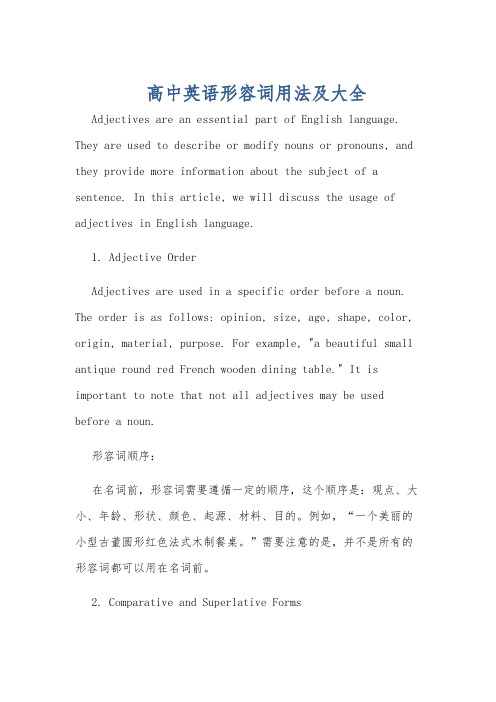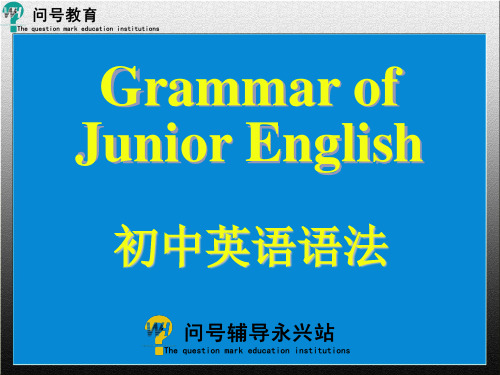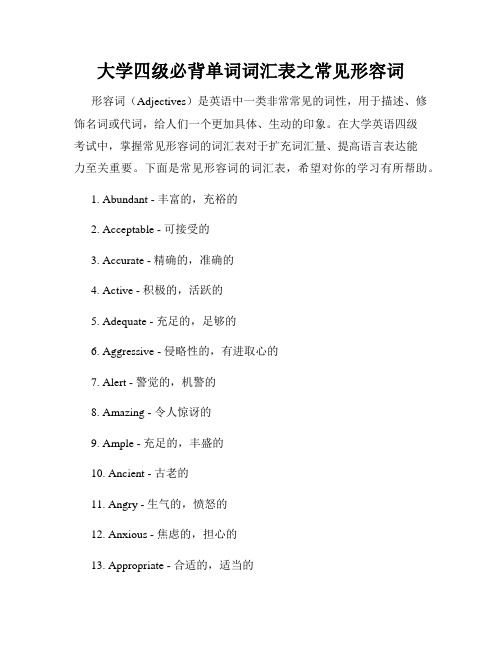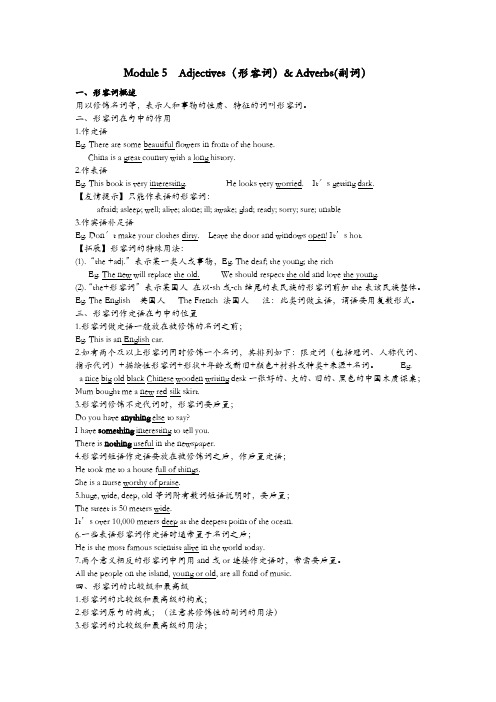adjectives 形容词介绍
形容词 Adjective

形容词Adjective(adj)一.形容词的定义、用法表示人或事物的属性或特征的词叫形容词(Adjective)。
形容词修饰名词为名词提供更多的信息,一般放在所修饰的名词之前。
但是如果形容词修饰something, anything, nothing 等不定代词时,要放在这些词之后。
表示意思“。
的”。
二.形容词的功能1.形容词用作定语,修饰名词Li Mei is a beautiful city girl.The new student comes from Japan.2.形容词用在be动词、系动词后,作表语系动词有:is(was) am(was) are(were)感觉类的feel taste smell sound look变化类的get turn become go come . grow表像类的appear seem表存在的.remain keepMy father’s car is very expensive.The mooncake looks delicious.3.形容词用作宾语补足语Don’t keep the door open.His success made him happy.4.“the+形容词”用作主语及宾语The old often think of old things.The new always take the place of the old.5.形容词有时也可用作状语或补语Please speak loud and clear.These soldiers spent three days in the cold weather,cold and hungry. 。
6.少数形容词只能作表语这些形容词包括ill,asleep,awake,alone,well,worth,glad,unable,afraid,alive等,只能作表语,不能作定语,描述人物状态,又称叙述性形容词。
高中英语形容词用法及大全

高中英语形容词用法及大全Adjectives are an essential part of English language. They are used to describe or modify nouns or pronouns, and they provide more information about the subject of a sentence. In this article, we will discuss the usage of adjectives in English language.1. Adjective OrderAdjectives are used in a specific order before a noun. The order is as follows: opinion, size, age, shape, color, origin, material, purpose. For example, "a beautiful small antique round red French wooden dining table." It is important to note that not all adjectives may be used before a noun.形容词顺序:在名词前,形容词需要遵循一定的顺序,这个顺序是:观点、大小、年龄、形状、颜色、起源、材料、目的。
例如,“一个美丽的小型古董圆形红色法式木制餐桌。
”需要注意的是,并不是所有的形容词都可以用在名词前。
2. Comparative and Superlative FormsAdjectives have comparative and superlative forms. The comparative form is used to compare two things while the superlative form is used to compare three or more things. For example, "John is taller than Tom" (comparative) and "John is the tallest person in the room" (superlative).比较级和最高级:形容词有比较级和最高级形式。
英语语法之形容词及词组

定语形容词和表语形容词
• 一般说来,形容词既可作定语又可作表语,但是,有些形容词 只用于名词前作定语,它们被称为定语形容词,而另有一些形 容词则只用作表语,它们被称为表语形容词。
理的
1. The wounded soldier looked ___ , but his weak breath suggested that he was still ___.
a. died; alive b. dead; alive c. death; living c. dead; y 2. The cake she made looks ____, but it tastes
• 表示极限意义,用 quite(完全),completely(完全),absolutely(绝对), altogether (完全),entirely(完全),totally(完全)等。
• You are completely wrong. 你完全错了。 • It’s absolutely impossible. 这是完全不可能的。 • The theatre was not quite full. 剧院尚未全满。 • That’s a totally different matter. 那完全是另一回事。 • It is more impossible for me to do this thing than for him (错) •
• 1.等级形容词等级形容词和非等级形容词
初中英语语法——形容词副词

A living language should be learned orally(口头上). (活的语言应该从口头上学)(被动句) We have a living hope that you will succeed. (我们强烈地希望你能成功) Is she still alive? (她还活着吗?) They are the happiest children alive. (他们是活着的最开心的孩子)
⒀ gone、lost与missing
gone表示“丢了,没了”,含一去不复返 的意思,也可以表示“死了”,作表语或 宾补,不可以作定语; lost表示“丢失”,含难以找回的意思, 可作定语、表语或宾补; missing表示“失踪了,不见了”,强调 某人物不在原处,可作定语、表语或宾补。
My fever(高烧) is gone, but I still have a cough. (发烧消退了,但我仍然咳嗽) The parents found the lost child at last. (家长终于找到了迷路的孩子) My dictionary is missing.Who’s taken it away? (我的字典不见了,谁拿走了?) For more detailed information(详情) of the missing girls, please visit our website(网址). (如果想知道失踪女孩们的 详情,请访问我们的网站)
⑿ special与especial
表示事件不同寻常、过分或特殊时,两个词可 互换,但special较为常用。另外,special还可 以表示特别的目的。 She pays (e)special attention to clothes. (她非常注重着装) These are special chairs for small children. (这些是专门给小孩子的椅子)
大学四级必背单词词汇表之常见形容词

大学四级必背单词词汇表之常见形容词形容词(Adjectives)是英语中一类非常常见的词性,用于描述、修饰名词或代词,给人们一个更加具体、生动的印象。
在大学英语四级考试中,掌握常见形容词的词汇表对于扩充词汇量、提高语言表达能力至关重要。
下面是常见形容词的词汇表,希望对你的学习有所帮助。
1. Abundant - 丰富的,充裕的2. Acceptable - 可接受的3. Accurate - 精确的,准确的4. Active - 积极的,活跃的5. Adequate - 充足的,足够的6. Aggressive - 侵略性的,有进取心的7. Alert - 警觉的,机警的8. Amazing - 令人惊讶的9. Ample - 充足的,丰盛的10. Ancient - 古老的11. Angry - 生气的,愤怒的12. Anxious - 焦虑的,担心的13. Appropriate - 合适的,适当的14. Artificial - 人造的,人工的15. Astonishing - 令人惊讶的,奇异的16. Authentic - 真正的,真实的17. Automatic - 自动的18. Average - 平均的19. Awake - 醒着的,警觉的20. Awful - 糟糕的,可怕的21. Awkward - 尴尬的,笨拙的22. Bad - 坏的,糟糕的23. Bare - 光秃秃的,仅仅的24. Beautiful - 美丽的25. Bitter - 苦的,痛苦的26. Black - 黑色的,黑暗的27. Blank - 空白的,无表情的28. Blind - 盲的,瞎的29. Blue - 蓝色的,悲伤的30. Bold - 大胆的,鲜明的31. Boiling - 沸腾的,炎热的32. Boring - 无聊的,令人厌烦的33. Boundless - 无限的,无边无际的34. Brave - 勇敢的,无畏的35. Bright - 明亮的,聪明的36. Broad - 宽阔的,广泛的37. Broken - 破碎的,损坏的38. Bumpy - 颠簸的,崎岖不平的39. Busy - 忙碌的,繁忙的40. Calm - 平静的,冷静的41. Careful - 小心的,仔细的42. Casual - 随意的,非正式的43. Certain - 确定的,某些的44. Cheap - 便宜的,低廉的45. Cheerful - 高兴的,快乐的46. Chilly - 寒冷的,凉爽的47. Chubby - 圆胖的48. Circular - 圆形的,循环的49. Clean - 干净的,清洁的50. Clear - 清晰的,明确的51. Clever - 聪明的,机智的52. Close - 关闭的,亲密的53. Cloudy - 多云的54. Clumsy - 笨拙的,不灵活的55. Cold - 冷的,寒冷的56. Colorful - 色彩缤纷的57. Comfortable - 舒适的58. Common - 普通的,常见的59. Concerned - 担忧的,关切的60. Confident - 自信的,有把握的61. Confused - 困惑的,混乱的62. Considerate - 体贴的,周到的63. Continuous - 连续的,继续的64. Convenient - 方便的,合适的65. Cooperative - 合作的,协作的66. Courageous - 勇敢的,有胆量的67. Crazy - 疯狂的,疯狂般的68. Creative - 创造性的,有创意的69. Crowded - 拥挤的,拥堵的70. Cruel - 残忍的,无情的71. Curious - 好奇的,求知欲强的72. Cute - 可爱的,漂亮的73. Damp - 潮湿的74. Dangerous - 危险的75. Dark - 黑暗的,阴暗的76. Dead - 死的,无生命的77. Dear - 亲爱的,昂贵的78. Deep - 深的,深奥的79. Definite - 明确的,确定的80. Delicious - 美味的,可口的81. Delightful - 令人愉快的,可喜的82. Depressed - 沮丧的,抑郁的83. Determined - 决心的,坚决的84. Dirty - 脏的,肮脏的85. Dissatisfied - 不满意的,心怀不满的86. Distinct - 明显的,独特的87. Dizzy - 头晕目眩的88. Doubtful - 怀疑的,不确定的89. Drab - 单调的,沉闷的90. Dry - 干燥的,干的91. Dull - 乏味的,枯燥的92. Dusty - 肮脏的,灰尘覆盖的93. Early - 早的,早期的94. Easy - 容易的,轻松的95. Elated - 兴高采烈的,欢欣鼓舞的96. Elegant - 优雅的,高贵的97. Embarrassed - 尴尬的,难堪的98. Empty - 空的,空虚的99. Enthusiastic - 热情的,热心的100. Excited - 兴奋的,激动的101. Exciting - 令人兴奋的,激动人心的102. Exotic - 异国情调的103. Fabulous - 极好的,令人惊叹的104. Fair - 公平的,相当的105. Faithful - 忠诚的,忠实的106. Famous - 有名的,著名的107. Fancy - 精致的,花式的108. Fast - 快的,迅速的109. Fat - 肥胖的,丰满的110. Fearful - 害怕的,恐惧的111. Feisty - 活泼的,好斗的112. Filthy - 污秽的,肮脏的113. Fine - 好的,上等的114. Flaky - 脆的,易碎的115. Flashy - 华丽的,浮华的116. Flawless - 完美无瑕的,无瑕疵的117. Flexible - 灵活的,柔韧的118. Fluffy - 蓬松的,松软的119. Foolish - 愚蠢的,傻的120. Formal - 正式的,庄重的121. Fortunate - 幸运的,侥幸的122. Fragile - 脆弱的,易碎的123. Frantic - 疯狂的,发狂的124. Fresh - 新鲜的,清新的125. Friendly - 友好的,友善的126. Frightened - 害怕的,受惊的127. Full - 满的,充满的128. Funny - 有趣的,滑稽的129. Gentle - 温和的,柔和的130. Gifted - 天才的,有天赋的131. Gigantic - 巨大的,庞大的132. Glad - 高兴的,快乐的133. Glorious - 辉煌的,光荣的134. Glossy - 光滑的,有光泽的135. Good - 好的,优秀的136. Graceful - 优雅的,文雅的137. Grand - 宏伟的,壮丽的138. Great - 伟大的,大的139. Greedy - 贪婪的,贪心的140. Green - 绿色的,青春的141. Grumpy - 坏脾气的,性情暴躁的142. Handsome - 英俊的,潇洒的143. Happy - 快乐的,幸福的144. Healthy - 健康的,健壮的145. Helpful - 乐于助人的,有帮助的146. High - 高的,高级的147. Hilarious - 滑稽的,欢闹的148. Holistic - 全部的,整体的149. Honest - 诚实的,正直的150. Hopeful - 有希望的,抱有期望的本篇文章介绍了大学四级必背单词词汇表中常见的形容词,这些词汇对于拓展词汇量、提高语言表达能力至关重要。
Adjectives 形容词

小升初语法大攻关(四) 形容词一、形容词的概念和类别1. 形容词在句子中用来修饰和描述名词或代词,表示人或事物的性质、状态和特征。
例:1)Pandas are fat and giraffes are tall. 熊猫胖,长颈鹿高。
2)This is a beautiful girl. 这是一个漂亮的女孩子。
3)There is a big mouse and a little elephant in this story. 在这个故事里,有一只大老鼠和一头小象。
2. 根据形式,形容词可以分为简单形容词和复合形容词。
简单形容词由单个的词构成;复合形容词一般由两个或两个以上的词构成。
“形容词+形容词”“形容词+分词”dark-blue深蓝色light-green浅绿色good-looking好看的new-born新生的“副词+形容词”“名词+形容词”ever-green长青的life-long终身的snow-white 雪白的例: 1)Mom gives her new-born baby a new nipple.妈妈给她新出生的宝宝一个新的奶嘴。
2)He is a good-looking boy.他是个漂亮的男孩。
3)I like his dark hair and his dark-blue eyes.我喜欢他黑色的头发和深蓝色的眼睛。
4)full-fat milk全脂牛奶pure white纯白色二、形容词的位置和顺序:通常位于名词之前或系动词之后。
当有两个或两个以上形容词修饰名词时,这些形容词有一定的排列顺序。
1.形容词在句子中的位置1)放在名词之前。
例:She is a world-famous scientist.她是一位闻名世界的科学家。
2)放在系动词之后。
例:My father is very fat, but my mother is very thin.我爸爸很胖,可我妈妈很瘦。
英语十大词性介绍

英语十大词性介绍在英语中,词性(Parts of speech)是非常重要的一部分,因为它们决定了词语在句子中的功能和作用。
以下是英语中的十大词性介绍:1、名词(Nouns):名词是用来表示人、事物、地点、观念等名称的词。
例如:book,table,chair等。
2、代词(Pronouns):代词是用来代替名词的词,以避免重复。
例如:he,she,it,they等。
3、动词(Verbs):动词是用来描述动作或状态的词。
例如:run,jump,walk,talk等。
4、形容词(Adjectives):形容词是用来描述名词或代词性质或状态的词。
例如:red,blue,fast,beautiful等。
5、副词(Adverbs):副词是用来修饰动词、形容词、其他副词或整个句子的词。
例如:quickly,happily,very,here等。
6、介词(Prepositions):介词是用来表示位置、方向、时间等关系的词。
例如:in,on,at,from等。
7、连词(Conjunctions):连词是用来连接两个或多个单词或句子的词。
例如:and,or,but,so等。
8、冠词(Articles):冠词是用来限定名词的词,包括定冠词(the)和不定冠词(a/an)。
9、数词(Numerals):数词是用来表示数量或顺序的词。
例如:one,two,three,first,second等。
10、感叹词(Interjections):感叹词是用来表示情感或呼声的词。
例如:oh,wow,uh-oh,hello等。
以上就是英语中的十大词性介绍。
了解和掌握这些词性是学好英语的关键之一,因为它们可以帮助我们正确理解和使用英语单词和句子。
在英语教育领域,存在许多不同的教学方法,每种方法都有其独特的优点和适用范围。
以下列出了十种广受欢迎且效果显著的英语教学法:1、语法翻译法(Grammar-Translation Method)语法翻译法是一种以语法为基础,通过翻译来进行英语教学的方法。
Module 5 Adjectives(形容词)& Adverbs(副词)

Module 5 Adjectives(形容词)& Adverbs(副词)一、形容词概述用以修饰名词等,表示人和事物的性质、特征的词叫形容词。
二、形容词在句中的作用1.作定语Eg. There are some beautiful flowers in front of the house.China is a great country with a long history.2.作表语Eg. This book is very interesting. He looks very worried. It's getting dark.【友情提示】只能作表语的形容词:afraid; asleep; well; alive; alone; ill; awake; glad; ready; sorry; sure; unable3.作宾语补足语Eg. Don't make your clothes dirty. Leave the door and windows open! It’s hot.【拓展】形容词的特殊用法:(1).“the +adj.”表示某一类人或事物,Eg. The deaf; the young; the richEg. The new will replace the old. We should respect the old and love the young.(2).“the+形容词”表示某国人在以-sh或-ch结尾的表民族的形容词前加the表该民族整体。
Eg. The English 英国人The French 法国人注:此类词做主语,谓语要用复数形式。
三、形容词作定语在句中的位置1.形容词做定语一般放在被修饰的名词之前;Eg. This is an English car.2.如有两个及以上形容词同时修饰一个名词,其排列如下:限定词(包括冠词、人称代词、指示代词)+描绘性形容词+形状+年龄或新旧+颜色+材料或种类+来源+名词。
- 1、下载文档前请自行甄别文档内容的完整性,平台不提供额外的编辑、内容补充、找答案等附加服务。
- 2、"仅部分预览"的文档,不可在线预览部分如存在完整性等问题,可反馈申请退款(可完整预览的文档不适用该条件!)。
- 3、如文档侵犯您的权益,请联系客服反馈,我们会尽快为您处理(人工客服工作时间:9:00-18:30)。
Classification of adjectives
big, small, bad, good, hot, cold
One-word adjectives
unkind, impossible, lovely voiceless a.+ a. bitter-sweet, light-blue a./ad. + ing participle good-looking
Central adjectives
used as modifier in a noun phrase subject/object complement
cannot satisfy both these requirements
Peripheral adjectives
Dynamic adjectives
a well-known German medical school an interesting little red French oil painting his first two interesting little red French oil painting
Adjectives denoting health conditions: well, ill Predicative adjectives
Non-gradable adjectives
perfect, excellent, extreme…
Adjectives and participles
Adjectives derived from –ing participles
alarming, boring, convincing, disappointing, encouraging, fascinating, heartening, inviting, lasting, missing, obliging, puzzling, refreshing, satisfying, tiring, vexing, worrying… Adjectives derived from –ed participles alarmed, bored, conceited, distinguished, educated, fascinated, hurried, interested, limited, noted, offended, pleased, reserved, tired, undecided, worried… badly-behaved, far-fetched, half-baked, highly-developed, newlyborn, newly-invented…
ancient manuscripts. (2002) A promising B agreeing C pleasing D obliging A 3. The party’s reduced vote was ___________ of lack of support for its policies. (2002) A indicative B positive C revealing D evident 4. There has been a __________ lack of communication between the union B and the management. (2002) A regretful B regrettable C regretting D regretted B family in Chinese cities now spends more money on housing than 5. The ____ before. (2002) A. normal B average C usual D geto -infinitive
She is stupid not to follow your advice. He was disappointed to hear about it. He was anxious to please his guest. He is impossible to teach. The government should be quick to react. Adjective + that-clause I am sure that you’ll succeed.= You are sure of success. She was amazed that he should arrive so soon. He is confident that he will be able to pass the exam.
B 6. During the summer holiday season it is difficult to find a(n) _______ room in the hotels here. (2002) A. empty B vacant C free D deserted 7. The first two stages in the development of civilized man were probably the invention of weapons and the discovery of fire, although nobody knows exactly A when he acquired the use of the ________. (2003) A latter B latest C later D last 8. With ________ exceptions, the former president does not appear in public A now. (2003) A rare B unusual C extraordinary D unique B 9. We have been hearing ________ accounts of your work. (2003) A favored B favorable C favorite D favoring D 10. During the summer holiday season there are no _______ room in this seaside hotel. (2003) A empty B blank C deserted D vacant
Adjective + prepositional phrase He was absent from the meeting. You should not be blind of the beauties of nature. He is famous for his fine acting. He is keen on politics. He thinks he is superior to us. I am week in French. I’m sick of winter. You book is very true to life. His work is worthy of praise.
Adjective (phrase) as modifier in noun phrases
Premodifying and postmodifying adjectives
When two or more premodifying adjectives appear on different levels, their normal order is like this: (determiner) → adjective denoting the speaker’s evaluation → adjective denoting size, shape, age → adjective denoting colour → adjective denoting nationality, origin, material → adjective denoting use or purpose → noun head
the members present = the members who were present a problem difficult to solve = a problem that is difficult to solve
Adjectives phrases as complement
Active vs. passive meanings
boiling water a charming girl exciting news a pleasing voice a terrifying story an interesting story contemptuous Credulous Dangerous Desirous Delightful Harmful Respectful Satisfactory Shameful Tiresome Troublesome boiled water a charmed girl an excited audience a pleased look a terrified woman an interested look contemptible credible endangered desirable delighted harmed respectable satisfied ashamed tired troubled
(cannot be placed before a noun as premodifier)
Adjectives with a- as prefix, such as: alike, alone, alive, asleep.
Adjective phrase vs. relative clause
